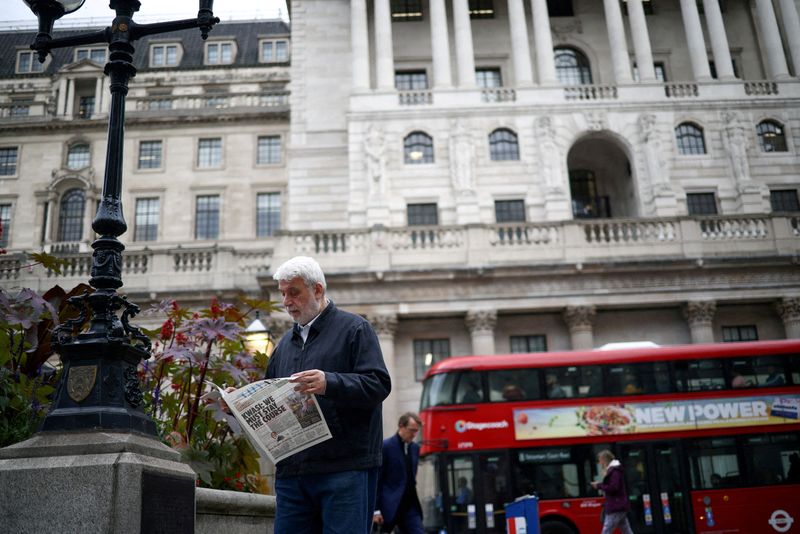By Sinead Cruise and Tommy Wilkes
LONDON (Reuters) - A Bank of England fix to ease pension schemes' cash crunch by getting banks to assume the role of rescue lender is being shunned by some of the biggest banks, who say the returns on offer do not reward the risks involved, sources said.
The BoE's Temporary Expanded Collateral Repo Facility, launched on Oct. 10, is a key part of the central bank's plan to avert further turmoil in money markets after it stops buying UK government bonds on Friday.
Banks offering the facility can pledge an expanded range of pension funds' assets with the BoE in return for short-term loans that can then be channelled back to a cash-poor pension fund's so-called Liability Driven Investment (LDI) manager.
Those loans should enable LDI managers to build liquidity buffers and meet any outstanding margin calls without having to engage in a fire-sale of pension funds' assets.
But it is unclear how many lenders are tapping the facility and whether pension funds are willing to shell out additional fees for what is a temporary solution, sources told Reuters.
Banks are reluctant to increase their lending to LDI funds through the repo facility, according to one official at a European bank.
Lenders would be taking on risks of any loan defaults, and there are further misgivings about how the assets they park at the central bank will be valued, which could also spawn additional losses.
"Repo-ing anything at the central bank will require banks to put their own balance sheet to work. There will be a charge associated with that," Imogen Bachra, Head of UK Rates Strategy, NatWest Markets, told Reuters.
"They will have to pass on those costs to the LDI who then passes these back on to the pension scheme."
So far, Barclays (LON:BARC) is the only major UK lender to have announced it will be participating.
The BoE declined to provide any details on lenders that are using the facility or the volume of cash lent since its launch on Monday. It plans to publish aggregate usage of the facility on Nov. 17, a week after the scheme closes.
The central bank also declined to comment on whether potential users could be deterred by the risks and charges associated with the facility.
A second source at a top global bank, who declined to be named, said their firm had "no current plans" to sign up, citing concerns over terms, risks and a preference to provide bespoke, alternative solutions to LDI counterparties needing cash.
The Pension Regulator declined to comment directly on whether it would encourage schemes to use the facility.
In an emailed statement on Thursday, TPR Chief Executive Charles Counsell again called on scheme trustees and their advisers "to review the resilience and liquidity of their investments, risk management and funding arrangements".
BRIDGING THE GAP
LDI is an investment strategy sold by asset managers like BlackRock (NYSE:BLK), Legal & General Investment Management and Insight Investment to pension schemes to help them match their assets and liabilities.
The strategy, which uses derivatives often juiced up with leverage, protects schemes from inflation and interest rate risk. More than 1 trillion pounds ($1.1 trillion) in assets are hedged using LDI.
But an unprecedented jump in bond yields following the UK government's mini-budget on Sept. 23 sparked a sudden surge in collateral calls from LDI providers, sending pension funds scrambling for cash to keep those derivatives in place.
The BoE was forced into a pledge to buy UK government bonds pension funds were dumping in a dash for cash it said threatened UK financial stability. Governor Andrew Bailey has rejected calls to continue buying bonds from pension funds which say they still need support beyond Friday.
The latest BoE facility was designed to help the largest schemes meet cash calls, which should help restore order in markets, according to one pension fund consultant, who declined to be named. But the solution was not "mass market", the consultant added.
Gabriele Foa, a fund manager at Algebris Investments said the repo programme served a purpose for the BoE by creating "distance between them and the problem."
Lending against those bonds, rather than buying them outright, appeared less contradictory with the BoE's stated strategy that it will shrink its balance sheet by offloading bonds it already owns, said Foa.
"They (the BoE) thought this could be fixed by simple signalling but a couple of weeks of bond-buying hasn't sorted out the problem," he said.
"It's a bridging tool that they can still use to keep the dialogue with the market and the pension funds going."
The repo facility is open until Nov. 10, beyond the BoE's next Monetary Policy Committee meeting on Nov. 3, when the bank is expected to hike interest rates aggressively.
Some questioned whether this was long enough.
"The facility is still very short term," said NatWest's Bachra. "In the LDI community, even a month isn't particularly long, they are a slow moving beast and when they move, they tend to move markets in big ways."
($1 = 0.9018 pounds)
